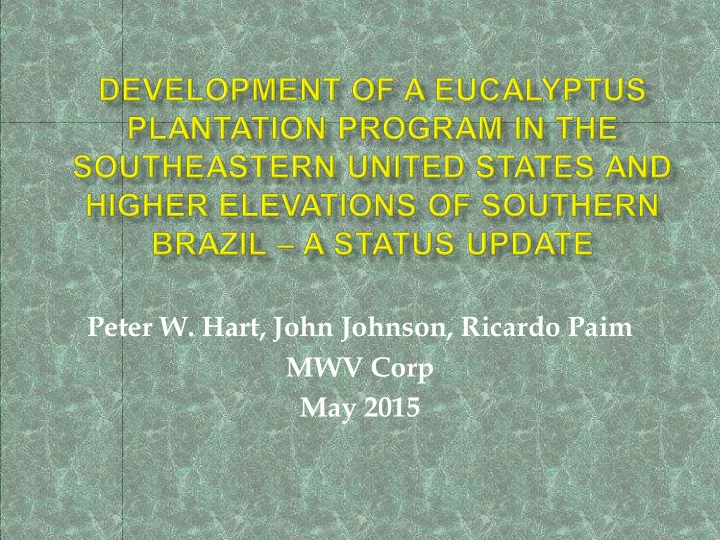

Peter W. Hart, John Johnson, Ricardo Paim MWV Corp May 2015
Availability of short fiber near the mill… Cost of long hauling short fiber to the mill… Texas mill uses about 2/3 short fiber… Southern Brazil has significant amount of higher elevation land subject to frost that cannot support current plantation efforts.
E. benthamii E. amplifolia E. macarthurii E. viminalis E. dorrigoensis Selected land races of E. camaldulensis
E. globulus E. nitens E. Gunnii E. dalrympleana
General bulk seeds show significant variation Low yield volumes per hactare Up until 2011 limited seed availability Only enough to supply 500 hectare /yr program Currently enough for about 20X more. Poor uniformity Inferior pulp physical properties
E. benthamii ideally suited for genetic manipulation through selective breeding Half-sibling block plantings starting this year Expect significant gains in volume, improved cold tolerance, improved plantation uniformity Next round plans to look at Specific gravity Fiber yield
Want enhanced growth, improved fiber yield and quality, improved disease and insect tolerance…along with cold tolerance Currently limited by Availability of desirable flowering mothers, pollen parents Cumbersome import/export laws for plant material
Have typically been opportunistic. Mother trees from in-door breeding orchards Randomly obtained pollen from various sources Crosses to date in greenhouse and field trials in SE United States include E. grandis X E. benthamii E. dunnii X E. benthamii E. benthamii X E. dunnii
The US program has greatly benefited from guidance and training from our Brazilian brethren. Rigesa has provided most of the bulk production seed through their orchards or through their commercial contacts Training in seedling production, field test design, plantation establishment and culture. Interspecific efforts relied heavily upon Rigesa breeding facility, staff, and outside contacts.
Southern US supplies regular, multiple, and varied cold/frost events Early and late season frosts Rapid temperature drops Prolonged freezing conditions Freezing rains Snow Families screened in US may be perfect fit for similar, higher altitude regions in southern Brazil and other areas in South America.
One site 1 yr old trees completely encased in ice!
For E. benthamii Trees snapped at bifurcations Some foliage loss Slight delayed start to early spring growth Some other species completely killed
Need to evaluate both High Yield and Bleachable Grade Pulps In Brazil (high yield) use as a pure species In Texas (bleachable grade) use as a partial replacement of mixed southern hardwoods
15.00 14.00 13.00 Dunni - Kappa 15.3 Benthamii - Kappa 15.3 12.00 11.00 10.00 Tensile Kgf 9.00 8.00 7.00 6.00 5.00 4.00 3.00 2.00 350 400 450 500 550 600 650 700 Canadian Standard Freeness mL
Lab Cook Results Yield slightly higher Screened Rejects Lower As a result of favorable lab studies, two mill scale trials were conducted using E. macarthuri grown in South Carolina – one w/ 42% sub, other w/ 33% sub – No changes in standard cooking or bleaching procedures required.
Over 4050 hectares planted in Texas area Two Brazilian seed orchards providing half-sibling families to be planted as family blocks Fall 2015 ( E. benthamii top performers) Texas field trials established for E. amplifolia E. grandis X benthamii E. dunni X benthamii Several pulping studies have been performed Future genetic improvements being planned and evaluated
Comments/Questions One Year Old E. benthamii Southeast TX
Recommend
More recommend